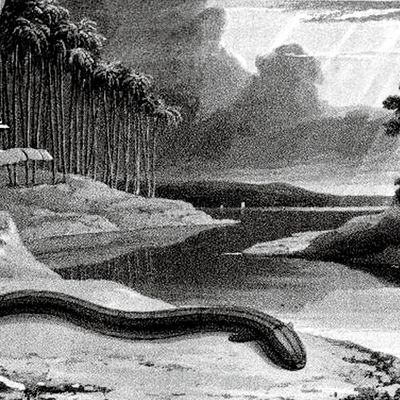The Book of Eels: Our Enduring Fascination With the Most Mysterious Creature in the Natural WorldBy Patrik Svensson.
Published by HarperCollins on May 26.
Save this article to read it later.

Find this story in your accountsSaved for Latersection.
My primary associations with Swedish people come from my mother, who is of Swedish blood and looks it.
(Picture a blonde garden gnome, but beautiful.)
How do you feel about eels?
But according toThe Book of Eels,Im not alone in my eelmania.
Aristotle thought eels were born from mud, spontaneously generating in the form of a slithering worm.
Archaeologists in Egypt have discovered tiny sarcophagi containing mummified eels.
The first question is: How do they mate?
We dont know, because no human has ever witnessed two of these eels getting it on.
(Which means, yes, nobody has succeeded in breeding these eels in captivity.
They simply wont be farmed.)
The second question is: Why do they live such bizarre lives?
It is the bizarre life ofAnguilla anguillathat Svensson outlines.
First, eels are fish, not aquatic snakes.
(You probably knew this.
I, an idiot, did not.
Sea snakes, however, are actual snakes.)
They have scales and gills, though both are barely perceptible.
They can move over land to get from one body of water to another (creepy).
They have a phenomenal sense of smell.
At a seemingly random point in their lives, they return to the Sargasso Sea to mate and die.
How do they find their way back?
Still unanswered, these questions.
Also, after roughly 40 million years on Earth, eels are mysteriously dying off at a rapid rate.
Probably it is our fault.
Svenssons interest in eels was a birthright.
(Svensson hated the taste: greasy, slightly gamy.)
By the authors account, every form of eel fishing has a spooky aspect to it.
They float in shoals over the surface like enormous, silvery tangles of seaweed.
A handful of glass eels looks like angels-hair pasta, if it were made of molten silver.
In Britain, eels are cooked into omeletlike elver cakes.
In 2016, a delightful and somewhat paralyzing book calledThe Soul of an Octopuswas published.
It was responsible for causing many people including, to my surprise, myself to stop eating octopus.
In my case, it wasnt the creatures cosmic intelligence that rendered it inedible but its playfulness.
Or that possessed a personality, in the true sense of that word, at all?
But the eel is not particularly intelligent.
When in captivity, it does not interact with humans in complex and heartrending ways.
The Book of Eelsis not the first general-audience book about eels to be published.
There are parts of the book where Svensson seems maybe a little too enamored of his subject.